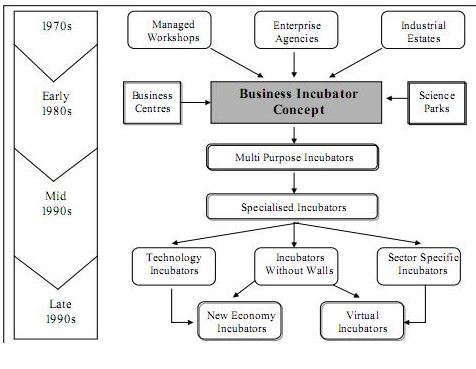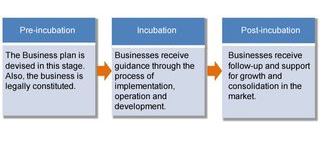Business incubation was a concept that started in the United States in 1959 when the Batavia Industrial Centre was opened. Incubation expanded in the US and spread to the UK, then Europe.
The following graphic shows a “potted history” of business incubation.

In Australia, business incubation was supported by governments in the 1990’s but since then, the term has been
somewhat debased by “fashion” and carpet-bagger consultants trying to ride a
catchy phrase transformed it to become an offering of its parts rather than as
a total concept.
Hence many consultants now offer “Business Incubation services” to Indigenous organisations, to the extent that in
Indigenous organisations today the term “Business Incubation” means to offer
community members some form of support to help them start business, whether
this be micro-financing, business planning services, or book-keeping services.
While these individual services can help Indigenous small business owners, taken as individual services they cannot
holistically help develop a start up business invariably conceived by someone
in the community who is starting up from ground zero. Business services provided
singly do not provide the support and tailored tutoring and mentorship to
ensure the business aspirants are taken on the whole journey of business
start-up and establishment. What is an aspirant going to do with “free”
book-keeping services when their business lacks capacity to stand up for
itself?
And yet, the Business Incubation concept can be a tremendous opportunity for PBC’s in particular as they struggle to
provide “stand on your own feet” benefits to their people. A true Business
Incubator “screens” business aspirants for their suitability and family support
systems, advising them properly if they or their business ideas are not suited
for start-up. The kindest help to give people is the truth, and then to assist
with alternative ideas to help them achieve economic sustainability.
In a meeting of a PBC I consulted to, I heard their non-Indigenous CEO exclaim, when the meeting was talking about
economic development through helping small business aspirants, “I don’t
understand, what are we supposed to do? Why do we want to help people start
businesses?
Hello! The alternative is a continuation of the social welfare paradigm.
So what is the Business Incubation concept, in its totality?

Broadly, the total Business Incubator is a combination of affordable physical space; initial screening of the aspirant and
idea; business planning; affordable, free or subsidized business services;
mentoring and coaching, especially around unfamiliar business concepts such as
marketing and systems; and formal tutoring and lectures on business principles
such as tax and the law.
Let me take you through the steps of how a PBC might establish a Business Incubator to explain how these services are
provided and to what end.
Clearly the PBC will need to ensure there is sufficient funding for the project, initially at least over a medium term of
2 to 3 years. This article is not about sources of funding, however sources
such as the IBA, ILC, state government regional funding programs, Local
Government joint ventures, assistance from banks and financial institutions as
part of their Reconciliation Action Plans, partnerships with commercial corporate
businesses, use of royalties and mining trust funds, and Federal and State
small business funding initiatives should be explored.
The next step is to decide on certain basics such as the types of small business you are intending to assist – should
these be small businesses, in this case defined to those that might employ at
least 1 or 2 staff other than the owner(s)? Should they be micro-businesses
defined here to mean businesses run by the owners and perhaps their immediate
family (some call these “kitchen-table businesses”)? Should the help be
extended to community social enterprises such as local community radio or the
arts centre? You cannot be all things to all people; decide on the sector most
capable of giving the community the head start in sustainable economic
development.
Other basic decisions should be about what business services you should provide and how you will do so. Do you have a
relationship with business advisers who can be called upon for probono or
subsidised services? Are there secondees and volunteers available? Should you
partner with the local university or regional TAFE?
Once you have made some basic decisions, you will also need access to some physical space. It is important that the
concept of a total Business Incubator is reliant on providing incubatees with
some physical space. Your targets are usually those people who cannot afford
their own business premises or where their home environments are not conducive
to working on the business – overcrowded housing, children, relations at home,
all conspire to derail a start up business. The Business Incubator space is not
intended to be a production space – for example a studio for arts and crafts –
but rather an office space to allow people to work ON the business.
The physical space is built around some “hot desks” that can be shared by incubatees, and include access to the
internet and email. It should have a shared reception and secretarial service
so that phone calls for the various businesses can be answered professionally,
messages taken, and typing and other secretarial services available. So many
Indigenous businesses are seen by the outside world as “unreliable” or “unprofessional”
because telephone contact with them and professional follow-up is so, well,
unprofessional.
Before they sign up, the incubatees must agree to undergo a screening exercise of themselves as well as their business
to see if they and their business ideas are suitable to be in business – if 80%
of businesses fail in the first year, they fail because of under-capitalisation
AND the unsuitability of the business owner to actually BE in business. Sorry,
some of us make better employees. Isn’t it better to know that up front and be
counseled?
- The incubatees will be expected to sign a contract to use the services, and this may involve some form of subsidised
payment for services, but importantly the contract should also ensure that:- - The incubatees are aware that they need to “graduate” and leave the Business Incubator after 1 or 2 year terms – this
allows for an “end game” to be the goal and also allows new incubatees to cycle
through the system; - The incubatees agree to attend a set number of lectures or business related courses a year and if they breach this they
will be asked to leave – this is not free space, this is an incubator that
helps people succeed if they want to succeed; and - The incubatees agree to an ongoing assessment of them and their businesses – this is intended to help them keep on
track and not a performance measure on continued attendance.
The services a Business Incubator offers – importantly in-situ and as part of the overall incubation agreement – can
include the following:-
- Reception and secretarial services
- Infrastructure and facility-based services
- Business Planning and monitoring
- Access to financing
- Access to B2B networks and professional
advisors - Education and training on business matters
and personal development - Book-keeping, accounting, taxation and
legal services - Marketing and brand-building, including
access to markets - Mentoring and coaching.
Finally you will need to think about what post-incubation support you will offer, if any. The following graphic shows the
stages of support that can be offered.

In conclusion, for PBC’s looking to plug in “economic development” as one of their goals for their people, a holistic
Business Incubator program provides significant opportunities. However these
opportunities are set up to fail if all a “business incubator” program does is
to provide some access to an accountant and maybe help people get grants to do
business plans.


